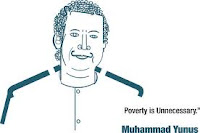Yunus’ Social Business & People-First Tourism

Muhammad Yunus leapt into the global spotlight when he and the Grameen Bank were jointly awarded the Nobel Peace Prize in 2006 for microlending efforts in Bangladesh. What most people do not realize, however, is that Yunus had been working to alleviate poverty in his home country since 1976, when he created the Grameen Bank. He has since launched more than 25 separate initiatives aimed at this objective.
In his 2007 book, Creating a World Without Poverty: Social Business and the Future of Capitalism, the economist presents his most recent and potentially world-changing idea: Social Business. His idea of Social Business is relatively simple, yet quite bold. A Social Business is a fully functioning enterprise aimed at a social good rather than profit-maximization.
“A social business is not a charity. It is a business in every sense. It has to recover its full costs while achieving its social objective. When you are running a business, you think differently and work differently than when you are running a charity. And this makes all the difference in defining social business and its impact on society (Yunus, p. 22).”
Yunus envisions social businesses replacing traditional philanthropic efforts, circumventing weak attempts at Corporate Social Responsibility, and evolving into a complex economic system alongside free-market capitalism.
Admittedly, Yunus is basing this idea on an incredibly optimistic view of human-kind. And we haven’t seen the sort of explosion of social businesses since 2007 that Yunus may have hoped for. Some of this can be explained by the global economic crisis, but organizations are still giving millions of dollars in aid, foundations are still funding non-profits and NGO’s, and charity is still the default mechanism for assisting the poor.
However, his idea does have legs. Perhaps the most compelling aspect of social business is that investors can expect a return on their investment. That is simply not the case with charity. If investing in a social business carries the same tax breaks as traditional philanthropy, why wouldn’t someone put their money toward these causes instead? They could use the same initial investment to fund multiple efforts (in much the same way Kiva operates). And his argument that social businesses will be more efficient since Executives and CFO’s won’t need to dedicate such a large portion of time toward fundraising cannot be ignored.
But perhaps most importantly, as we have seen time and time again, many people really are interested in giving back and are dedicated to improving the lives of others. It is Yunus’ belief, and mine as well, that if we can leverage the efforts of these individuals in a cohesive way, we can truly make a difference.
Now, what could be the impact of Social Business for People-First Tourism? Both Social Business and People-First recognize the entrepreneurial spirit of people throughout the world. As Yunus discovered in Bangladesh, individuals (often poor and living in rural locations) can make great strides to improving their livelihoods given even a small opportunity. People-First Tourism is the type of initiative that could give them this sort of opportunity.
People-First may or may not operate as a true social business in the future, but it could certainly support these types enterprises across the globe. With a small initial input, but a lot of enthusiasm and innovation, People-First can connect individuals worldwide interested in supporting small entrepreneurs and service providers in travel destinations. By providing the platform, it can help people eleviate their situation and create a better life for themselves and their children. We encourage you to consider the impacts of Social Business for People-First Tourism and look forward to your feedback on how to help create sustainable and dignified livelihoods through tourism world-wide.



Thank your for posting about this book and it's message. I enjoyed his book about the creation of Grameen Bank and it showed me a different way to think about helping those with less opportunities. As I read the book though, I asked myself, can microcredit function in the U.S. economy? I followed the processes as it was to introduced here, but saw how difficult the battles were to bypass or get new legislation.
ReplyDeleteAs I read the idea Yunus expressed in "Creating a World Without Poverty", I saw he had created something, that if taken up by passionate people here in the U.S., could work within our system of capitolism, and improve it.
I know we haven't seen an explosion of social businesses, but I also don't think the book and idea was brought to the attention of the right group. We need to be aiming at students, and those freshly graduated. They aren't yet set in their ideas of how the system works, and as a generation, they're questioning the strength of our current way of doing things. By meeting the idea early on, we can hope to keep it as an option as this group becomes the decision makers.
That is good to know that you were also thinking of other factors aside from your company when dealing with your business. Keep up the good work guys.
ReplyDeleteinternational business company